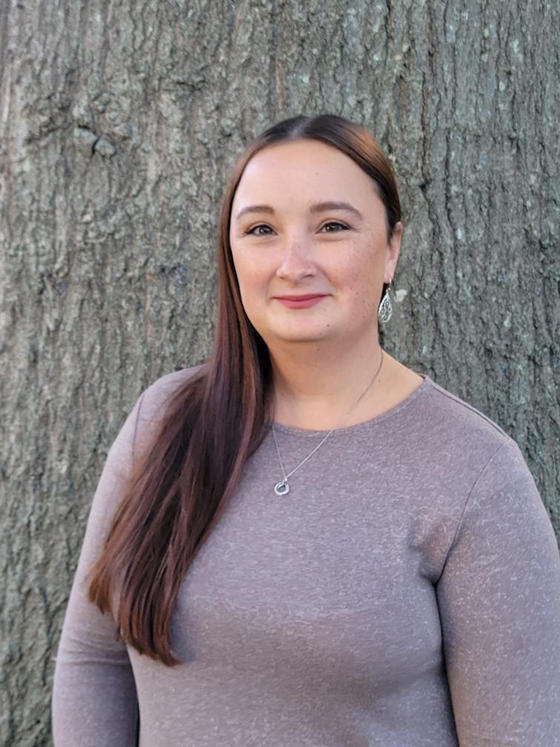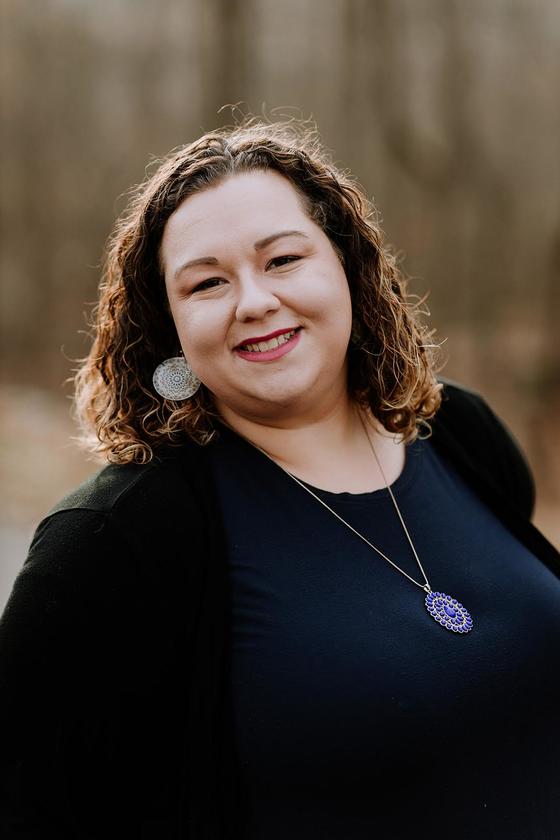
About this Program
Advanced clinical practice, scholarly inquiry and leadership in a rapidly growing field.
Program Overview
Tuition & Fees
Funding Opportunities
The Doctor of Philosophy in Counselor Education and Supervision program at Hood College is dedicated to producing proficient and empowered counselors, supervisors and counselor educators, who will be equipped to lead in both clinical and academic settings. Grounded in the values of inclusivity, social justice and collaboration, graduates of the program are poised to shape the future of counseling and education, contributing to the well being of individuals and communities alike.
Our 60-credit program, based on CACREP guidelines, combines coursework in counseling, supervision, teaching, research and scholarship, and leadership and advocacy. You will also complete a series of hands-on internships, as you demonstrate your clinical counseling and clinical supervision skills working with clients and supervisees at the NeighborHood Counseling Training Center. Throughout the program, you will conceptualize, research, write and defend your dissertation, which will be based on your own unique personal and professional goals in collaboration with faculty advisement.
The counselor education and supervision Ph.D. program will pursue accreditation by the Council for Accreditation of Counseling and Related Educational Programs (CACREP).
Schedule:
Applications open: August 19, 2025
Applications due: January 10, 2026
In-Person interviews: February 7, 2026
Program start date: August 2026
Degrees Offered
- PhD
Department Offering
Related Graduate Programs
Are you ready to go further?
Application Deadline: extended to January 12, 2024 (in-person interviews on March 1, 2024)
Along with their application, candidates must submit:
- Resume/CV.
- Official transcripts.
- Personal statement.
- Three letters of recommendation.
Resume/CV
Candidates should submit a resume or CV detailing their counseling-related training, work experiences and scholarship.
Transcripts
Transcripts must demonstrate completion of an advanced degree (M.A., M.S. or Ed.S.) from an entry-level graduate counseling program, with preference given to CACREP-accredited programs. Transcripts should reflect the academic program and credits earned. If transcripts do not reflect CACREP accreditation status, please include that in your career goals statement.
Applicants must have completed 60 credit hours of graduate counseling coursework necessary for licensure as a professional counselor or school counselor. If the advanced degree program involved only 48 credit hours, applicants need to complete 12 additional credit hours to meet licensure requirements. Candidates must submit official transcripts documenting the completion of both undergraduate and graduate degrees, including any supplementary courses to become an LGPC/LCPC.
Personal Statement
This essay should be no more than two pages in length, single-spaced. This essay provides you with an opportunity to supplement the other information available to the admission committee relative to your objectives in pursuing doctoral work. The statement should include:
- Personal information and background relevant to doctoral work in counselor education.
- Why you decided to apply to Hood College's counselor education and supervision doctoral program.
- Strengths and areas of change in relation to the counseling profession. Consider these questions: What strengths do you have that would contribute to you being a good counselor educator? What do you believe to be the facets of your personality, behvaior and outlook that, if modified or changed, would make you a better person/counselor/educator? What plans, if any, do you have for making any such change(s)?
Letters of Recommendation
Three letters of recommendation concerning the applicant's academic and professional abilities and potential are required. These letters should address the applicant's ability to meet graduate-level academic challenges and to work in the counseling professions. At least one individual should be well acquainted with the candidate's academic potential. At least one person should be a supervisor or trainer who can discuss in detail the applicant's counseling skills.
Our mission statement and program objectives are based on 2016 and 2024 CACREP standards.
Mission Statement
The mission of the Doctor of Philosophy in Counselor Education and Supervision is to align with Hood College to empower students to use hearts, minds and hands in clinical and academic settings, while extending the knowledge base and goals of the graduate programs in counseling. With a focus on teaching and clinical practice, the program aims to produce competent counselors and counselor educators who engage in research, teaching, supervision, leadership and advocacy that values an anti-racist stance. We advocate for a commitment to social justice and the elimination of oppression in our shared communities through a collaborative mindset.
Program Objectives
- Clinical Work and Supervision: Students will gain an advanced understanding of the theoretical frameworks that guide counseling practice and supervision, conduct effective counseling sessions and develop treatment plans utilizing evidenced-based practices, while fostering critical self-awareness and personal growth featuring cultural humility and competence.
- Teaching and Leadership: Students will develop a strong theoretical foundation in pedagogy and andragogy by approaching this task with critical reasoning to assist in developing future educators and leaders who assess and evaluate the diverse needs of students to provide culturally responsive and inclusive educational leadership.
- Research and Scholarship: Students will acquire a strong understanding of research design, methods and statistical analysis to critically evaluate research literature, develop research questions, design studies, collect and analyze data, and interpret findings to promote a diverse scholarly mindset that enhances research ethics, advocacy and integrity.
- Social Justice and Advocacy: Students will develop a comprehensive understanding of social justice issues and advocacy as well as its impact on individuals, families and communities to understand and address systemic problems relevant to the counseling profession through awareness of their own biases and privilege, as they work towards become culturally competent educators.
- Dispositional Awareness: Students will cultivate and exhibit ethical behavior, integrity and professionalism in their roles, including self-awareness and personal growth, cultural competence and inclusivity, personal and professional boundaries, effective communication skills, resilience and adaptability, emotional stability and self-control, and openness to feedback to develop the foundational qualities, attitudes and behaviors required of effective counselor educators and supervisors.
The NeighbordHood Counseling Training Center (NCTC) is run by our graduate-level counseling students during their field experience, supervised by our faculty members, clinical director and doctoral students. We aim to help people in Frederick and surrounding areas with the following:
- Adjustment and relationship issues.
- Mild-to-moderate depression and anxiety.
- Life transitions.
- Mild-to-moderate post-traumatic stress.
For more information and to contact the clinic, click here.
This project is supported by the Health Resources and Services Administration (HRSA) of the U.S. Department of Health and Human Services (HHS) as part of an award totaling $1,298,013 with 0 percentage financed with non-governmental sources. The contents are those of the author(s) and do not necessarily represent the official views of, nor an endorsement, by HRSA, HHS or the U.S. Government. For more information, please visit HRSA.gov.
The Ph.D. program in counselor education and supervision requires a minimum of 60 graduate credit hours beyond an approved master’s degree.
This concentration consists of theory, research, professional application, dissertation and specialization based on electives, all of which extend the knowledge base of the counseling profession in a community of scholarly inquiry and engagement.
CES Degree Plan
| First Year | Second Year | Third Year (Dissertation) |
| Fall 9 credits | Fall 9 credits | Fall 6 credits |
| Spring 9 credits | Spring 9 credits | Spring 3 credits |
| Summer 6 credits | Summer 6 credits | Summer 3 credits |
| 24 credits total | 24 credits total | 12 credits total |
Course Listings
Theory (12 credits)
- CNED 602 - Advanced Theories in Counselor Education and Supervision
- CNED 605 - Pedagogy and Andragogy in Counselor Education and Supervision
- CNED 607 - Leadership and Consultation in Counselor Education and Supervision
- CNED 609 - Advocacy in Counselor Education and Supervision
Research (15 credits)
- CNED 601 - Professional Issues in Counselor Education
- CNED 604 - Scholarly Writing and Presentations in Counselor Education and Supervision
- CNED 608 - Research Methodologies: The Design, Implementation and Evaluation of Counseling Research Projects
- CNED 611 - Statistical Methods for Social Science Research: Design and Analysis
- And at least one of the following:
- CNED 612 - Advanced Quantitative Methods
- CNED 613 - Advanced Qualitative Methods
Professional Application (12 credits)
- CNED 600 - Advanced Counseling Techniques and Treatment Planning
- CNED 603 - Advanced Counseling Skills
- CNED 606 - Doctoral Teaching
- CNED 610 - Supervision Theory and Practice in Counselor Education and Supervision
Specialization (Choose 9 elective credits)
- COUN 507 - Trauma and Crisis Intervention (3 credits)
- COUN 521 - Grief, Mourning and Bereavement (3 credits)
- COUN 523 - Principles of Thanatology (3 credits)
- COUN 528 - Developmental Perspectives in Thanatology (3 credits)
- COUN 529 - Historical and Multicultural Perspectives in Thanatology (3 credits)
- COUN 543 - Counseling Youth (3 credits)
- COUN 560 - Affirmative Therapy with LGBTQIA+ Clients (1 credit)
- COUN 561 - Sexual Wellness in Counseling (3 credits)
- COUN 562 - Attachment Theory in Clinical Practice (1 credit)
- COUN 563 - Foundations in Eye Movement Desensitization Reprocessing (1 credit)
- COUN 564 - Psychopharmacology (1 credit)
- COUN 565 - Introduction to Creativity in Counseling (1 credit)
- COUN 567 - Foundations of Disaster Mental Health (1 credit)
- COUN 599 - Special Topics in Counseling (1-3 credits)
Comps and Dissertation (12 credits)
NOTE FOR DOCTORAL STUDENTS WHO ARE WORKING ON THEIR DISSERTATION.
Students are highly encouraged to develop interdisciplinary scholarship through their dissertations and other research expectations. Doctoral students work closely with faculty in designing, implementing and evaluating innovative educational and research projects in response to the needs of society.
Writing the dissertation requires a major commitment of time and effort on both the part of the doctoral student and the faculty adviser. There should be consultation between the student and the dissertation chair about what is expected to be accomplished and how much time is to be invested before the student registers.
Coming soon!
3-4 Years
Average Completion Time
60 Total Credits
Program Contact

Program Director

Director of Graduate Admissions

Graduate Student Spotlight | Darian Little
"As an alumnae of Hood College and a Frederick native, I jumped on the opportunity to continue my education at Hood College because of the professors and opportunities they provide."

Graduate Student Spotlight | Hanna Murchake, M.S.'21
"I chose to come back to Hood knowing the high caliber of education that I would receive and the familiarity. As a graduate of the master's program, I saw how well I was prepared by the faculty to enter the workforce and know the Ph.D. program will be the same."

Graduate Student Spotlight | Stephanie Miller
"Hood has always been a special place for me, so it made sense for me to return. I have so many fond memories of my previous studies at Hood, including the close-knit community and the genuine care and support I received from faculty and staff."
